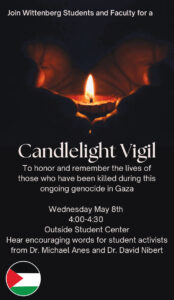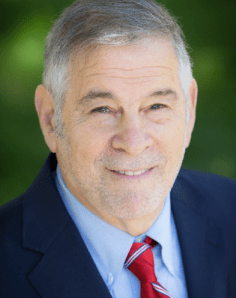Editors Note: This Story Originally Appeared in the Dayton Jewish Observer.
Associate Prof. of Psychology and Department Chair Michael Anes is a beloved member of the faculty at Wittenberg University in Springfield. So beloved that the graduating class of 2024 named him an honorary member — the second time he’s received such an honor over his 20 years with the small, private liberal arts college.
On June 1, he and his wife, Associate Prof. of Political Science Heather Wright, will lead Wittenberg students on the couple’s third Holocaust field study trip to Poland.
This time, the U.S. Department of Education has awarded them a Fulbright-Hays Group Projects Abroad grant, allowing them to expand the 30-day study trip to include two additional faculty members and six high school teachers from across Ohio who teach history, government, and psychology courses.
The 14 participants will specifically explore “the tension between democratic pluralism and nationalistic exclusion of the ‘other.’” Their trip will also involve “increasing, strengthening, and diversifying the coverage of Polish issues in Ohio public schools and at Wittenberg, especially as it relates to the effects of Ukrainian immigration and the Holocaust.”
Anes has occasionally taught about the psychology of the Holocaust. He’s also one of the university’s genocide educators.
Toward the end of the spring semester, he made it publicly known on campus and social media that he believes Israel is committing genocide in Gaza.
However, he declined to be interviewed by The Observer about how he came to that conclusion.
“Current situation: not going to sit quietly behind a keyboard when I can be supportive of others wanting to learn and speak — in public. #stopgenocide #stopgenocideingaza #stopfamine,” Anes posted on his Facebook page April 29 along with photos of him on campus sitting beside a banner that read, “Stop Genocide And Famine.”
In the comments below that post, he elaborated: “Students stop by and talk briefly. We have a few faculty involved. This is a very small-scale thing that will continue through the week as I can, and will likely remain small. Some students expressed interest so I am just trying to model that they can do something in public and that we can all be non-confrontational or respectful.”
Anes was one of two speakers to offer “encouraging words for student activists” May 8 when Wittenberg students and faculty held a candlelight vigil “to honor and remember the lives of those who have been killed during this ongoing genocide in Gaza.”
“I’m very pleased to take part in it,” Anes wrote of the event when he posted about it. In the comments, he added that the sign he has near him “when I ‘protest’ mentions the need for hostage release. It is absolutely a genocide.”

Promotion flyer for a vigil at Wittenberg to remember those ‘killed during this ongoing genocide in Gaza,’ with Anes speaking.
The Observer corresponded back and forth with Anes about his accusations of genocide against Israel. The professor, who is Jewish, touched on why he decided to share his opinion publicly, but despite repeated requests, declined to present empirical evidence to back his conclusion.
The closest he came was a post to his Facebook page May 11 citing Hebrew University of Jerusalem Prof. of Holocaust History Amos Goldberg, who says Israel is committing genocide in Gaza.
In his essay, Yes, it is genocide, Goldberg writes: “What is happening in Gaza is genocide because the level and pace of the indiscriminate killing, the destruction, the mass deportations, the displacement, the starvation, the executions, the elimination of cultural and religious institutions, the crushing of the elites (including the killing of journalists), and the sweeping dehumanization of the Palestinians — create an overall picture of genocide, of intentional and conscious crushing of the Palestinian existence in Gaza.”
Michael Berenbaum, director of the Sigi Ziering Institute: Exploring the Ethical and Religious Implications of the Holocaust, and distinguished professor of Jewish studies at the American Jewish University in Los Angeles, has spent his lifetime studying genocide. He told The Observer in an interview that he considers Goldberg a credible scholar of genocide. But Berenbaum said Goldberg is wrong.
“The legitimate and credible scholars can be wrong. What I’d like them to do is tell me what element of genocide is present at that point? There are those in Israel who advocate for genocide. Look, the entire case of genocide made at the International Court of Justice was made in language with the government of Israel and its political leaders, which should disturb us. That’s not the policy that’s being done.”
Berenbaum was the project director who oversaw the development of the United States Holocaust Memorial Museum and served as the first director of its research institute. From there, he became president and CEO of the Survivors of the Shoah Visual History Foundation, which documented and preserved the testimony of 52,000 Holocaust survivors across the world.

American Jewish University Prof. of Jewish Studies Michael Berenbaum
“The war is brutal, difficult, painful,” Berenbaum said. “There are deep and profound losses on the side of the Palestinians. That’s not genocide. There could be an accusation of war crimes. And if there are war crimes, there are war crimes on both sides, because what happened on Oct. 7 was a war crime.”
He added that Israel has the capacity to commit genocide.
“It’s an overwhelming power, it has the ability if it wanted to, to commit genocide. Yet the population, and we see this in a very interesting way, the Palestinian population is increasing over the long run. Significantly. So if it were committing genocide, it is deeply and profoundly incompetent doing it.
“Should Israel be more generous, more forthcoming in bringing aid into the Gaza population? Absolutely. Should Israel be wiser about what it’s doing? Absolutely. I think it should get rid of its current government, period. But that’s a different story.”
Polish Jewish lawyer Raphael Lemkin invented the word genocide in 1944 to mean the intentional “destruction of a nation or of an ethnic group.”
“That’s not what’s happening here,” Berenbaum said. “You have urban warfare in which essentially the enemy is hiding in the normal infrastructure of a civilian population, including schools, mosques, and hospitals. And therefore, Israel is, however you want to evaluate it, trying to face that. It is not slaughtering wholesale the Palestinian population.”
Berenbaum did say he wishes Israel was going after Hamas more precisely.
“It is fighting a war in which — and you have a moral question of the highest magnitude, and I’ve worked on just war theory — the question is whether you can fight a just war justly under the circumstances that Israel is facing. And the answer to that is, we don’t know.”
He emphasized that the only way a scholar could argue that Israel is committing genocide in Gaza would be based on what he described as a flaw, a “problematic element” in the language of one provision of the U.N. genocide convention.
“The Convention on Genocide prohibits killing of persons belonging to a group in whole or in part. And the problem with ‘in whole or in part’ is it never defines ‘in part.’ That can be one person, two people, three people — that would technically be a part. But there’s certainly no comparisons to the Holocaust, certainly no comparisons to Cambodia, certainly no comparisons to Rwanda. Certainly, no comparisons to the Armenians.
“We all know in the human rights community that the nonspecificity of the ‘in whole or in part’ is a problematic element of it. It’s an attempt to ultimately identify the Israelis with the Nazis. This is not a Nazi operation. And that’s whether you like or not like the nature of the Israeli response. The people who are interested (in genocide) are certainly in the right-wing of Israel. They’re interested in ethnic cleansing, forcing them out. Israel is not doing that.”
Berenbaum said he doesn’t trust the casualty numbers on either side of the Israel-Hamas war.
“I grew up in the Vietnam generation. But if we look at what Israel claims the numbers are and what the Palestinians claim the numbers are, there may be as little as a 2:1 ratio of civilian casualties with military casualties. If it’s a 2:1 ratio for urban warfare, in the history of warfare, that’s not good, but it’s also not bad.”
Wittenberg’s Anes pointed out to The Observer that he doesn’t align with calls to dismantle Israel, and that he prefers to think of his role as just a student facilitator.
“My activism is really only to get the students started. We have a very small number of students who are knowledgeable or care. My job has been to model that they can express themselves non-confrontationally. We had one event on campus that was well-attended and then a second smaller one, but not until April. We are hardly a hotbed of activity.”
Anes also emphasized he will not draw a direct line between the Holocaust as it was carried out in Poland, or any other genocide, and Gaza.
“Genocides are not conducted in the same way across the world and over time.”
He noted he’ll continue to support student protests accusing Israel of genocide in the fall if students decide to pick them up.
Anes’ wife, Heather Wright, is also Jewish. An associate professor in the political science department, she teaches classes on human rights and about Israel in her Holocaust Politics course.
She told The Observer in an email that she does not share her husband’s view that Israel’s “self-defensive response constitutes genocide.”

Wittenberg Assoc. Prof. of Political Science Heather Wright. Photo: Wittenberg University.
Wright sent the email to reiterate that Anes did not want to be interviewed “or included” in this story.
“The Fulbright-Hays grant was awarded by the U.S. Department of Education to me, as a political scientist, under the auspices of Wittenberg University. The project proposal, content, and award contain zero content about either Israel or the Gaza conflict, which Michael has told you on two separate occasions,” she wrote.
“It is unfortunate that you feel the need to exaggerate and mischaracterize Michael’s support of our students and his sharing of a flyer on Facebook, which you only had access to because you and Michael are personal Facebook friends.”
“I have to say that he’s not going to get away with that,” Berenbaum said of Anes’ plans to avoid the topic of Gaza and Israel while in Poland.
“The place from which you remember an event shapes how you remember it,” Berenbaum said. “Place is not merely geographical, it’s place in time. And everybody is going to ask a question about that. People are going to ask questions.”
The notion that Israel behaves like Nazi Germany, Berenbaum said, has been a staple of anti-Israel propaganda for almost 50 years.
“It coincides with the Soviet accusation that Zionism is racism, which was in the ’70s (1975 at the U.N.). That was a Soviet thing propaganda-wise to associate Israel with Nazism and the like and to use it as a tool of delegitimization.
“Every scholar who writes that Israel is committing genocide should be prepared to defend it. Not giving you an interview or not being prepared to defend that, that’s not scholarly. If I write something, I’ve got to be prepared to defend it. Whatever I say, I have to be willing to defend.”














